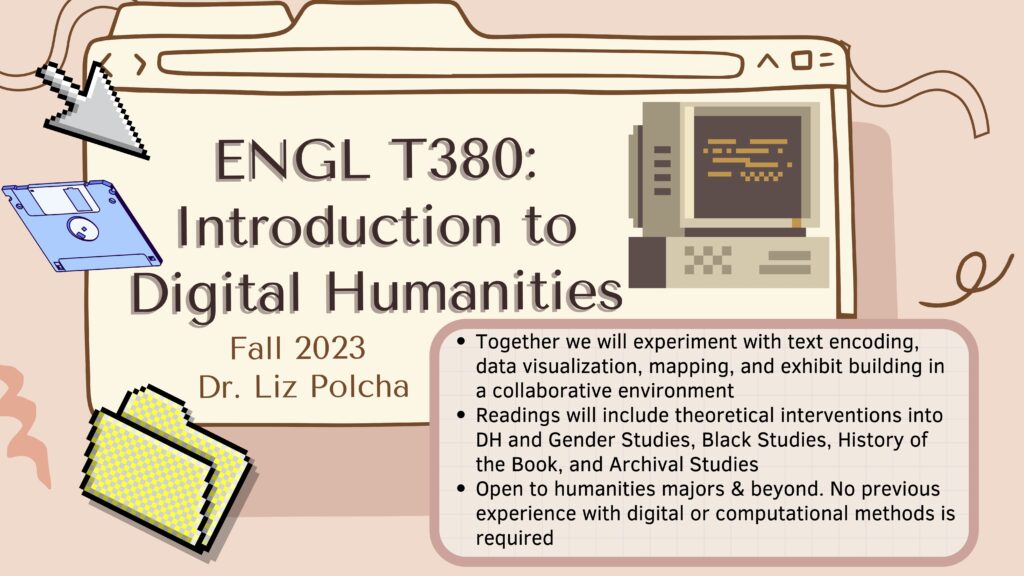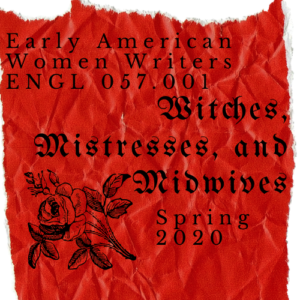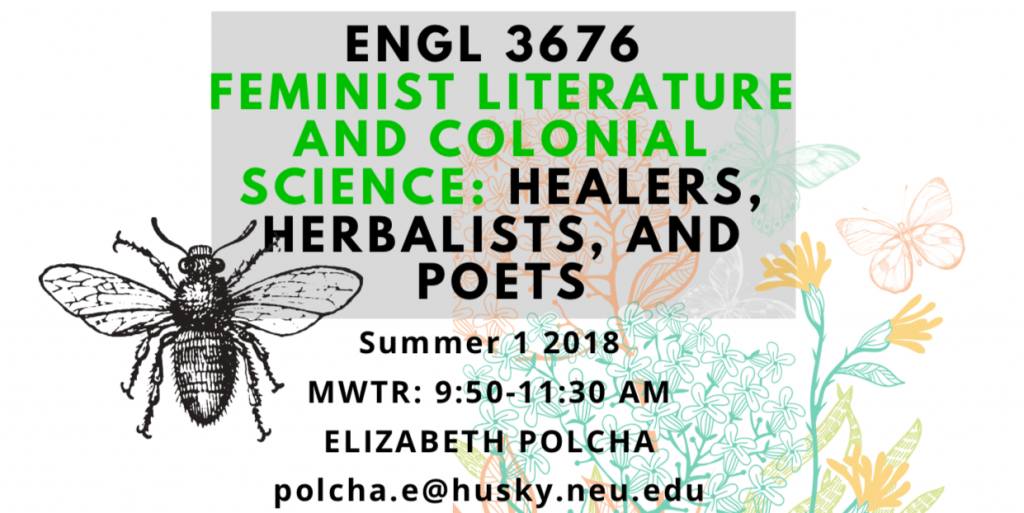I have fourteen years of experience teaching literature, writing, and humanities research methods to undergraduate and graduate students. I have taught at both public and private R1 universities, as well as at two community colleges.
In my years as a instructor of writing and literature, I have received multiple teaching awards, including the Fred L. Standley Award for Most Effective Teacher Among Graduate Assistants at Florida State University and two Outstanding Graduate Student Teacher Awards from Northeastern University—one from the Provost’s office, and one from the College of Social Sciences and Humanities.
For specifics on a few recent classes I’ve taught, see the below examples of ENGL T380, ENGL 103, ENGL 057, and ENGL 3676:

This class, offered in Drexel’s department of English and Philosophy in Fall 2023, is designed as a broad introduction to the Digital Humanities (DH) for undergraduate students who are new to the field of DH and its methodologies. This course centers collaboration and project-based learning in a friendly environment where experimentation is encouraged. Each week we will participate in a lab activity, where you will engage in hands-on digital and public humanities methodologies. These lab activities will include: writing metadata for digital archives, using web-based platforms to experiment with humanities data, and practicing some basic text encoding. We will also read theory on archival studies, political histories of computing and technology, queer studies, ecocriticism, and feminist studies alongside our lab activities. Beginners to computational methods, and to theory, are welcome!
This ENGL 103 writing class, offered in Drexel University’s department of English and Philosophy, asks that you read, think, and write about gender, sexuality, and science fiction across ten weeks. It is primarily a writing class, but will involve a fair amount of reading as well – including shorter and longer works of science fiction and fantasy. Readings will include fiction and theory by Octavia Butler, N.K. Jemisin, Alexis Pauline Gumbs, and Ken Liu, among others. Assignments will include research-based writing and opportunities for creative writing and curation, including digital and experimental writing.
ENGL 057: Witches, Mistresses, and Midwives: early American Women Writers
This early American literature course, offered in the University of Pennsylvania’s department of English in Spring 2020, was framed around gender, sexuality, and the question of “women’s writing” in the colonial Americas. This course offers a deep-dive into the under recognized women writers of the colonial Americas, using critical frameworks of race, gender, and sexuality to bring the banished, the deviant, the incarcerated, and the erased into the canon of American literature. We will therefore read across genres of texts—both in and out of print—such as natural histories, testimonies, diaries, letters, epistolary novels, and visual and material culture. Across these genres, our readings are organized chronologically: moving from the late 17th century through the late 19th century. This course takes a nontraditional approach to the teaching of early American literature, asking students to consider how genres of writing, both private and public, shaped early nationalist and imperialist ideals of bodies, families, and sexual freedom in the so-called “New World.”
Selected Required Readings:
• Aphra Behn, Oroonoko, and Other Writings. Edited by Paul Salzman. Oxford World’s Classics edition, 2009.
• Sor Juana Inés de la Cruz, Selected Works, translated by Edith Grossman, Intro by Julia Alvarez. Norton, 2014.
• Richard Godbeer. The Salem Witch Hunt: A Brief History with Documents, Second Edition. Bedford Series, 2017.
• Harriet Jacobs. Incidents in the Life of a Slave Girl, Edited by Nell Irvin Painter. Penguin, 2000.
• Phillis Wheatley, Complete Writings, edited with an intro by Vincent Carretta. Penguin, 2001.
• Unca Eliza Winkfield, The Female American, second edition, edited by Michelle Burnham and James Freitas. Broadview, 2014.
• The VVitch: A New England Folk Tale (2015) directed by Robert Eggers.
ENGL 3676: Representing Gender and Sexuality in Literature
This literature course, offered in Northeastern University’s English department in Summer 2018, took on the history of science from the perspective of contemporary feminist and postcolonial writers and scholars.
When thinking of the terms like “colonial science” and “natural history,” an image of European men in tricorn hats recording their newest discovery likely comes to mind. This course offers an alternate image of the colonial scientist, as seen through the lens of 20th and 21st century feminist, Indigenous, and anti-colonial novelists, poets, and activists who resist traditional narratives of the history of science and colonialism through their writings, art, and healing practices. Sitting at the intersection of ecofeminism, postcolonial feminism, and critical race studies, the readings for this course challenge Eurocentric and colonial notions of scientific history, namely in herbalism, medicine, and reproductive health. As a class, we will discuss feminist fiction that writes back to colonial history, such as Maryse Condé’s I, Tituba, Black Witch of Salem, and historical scholarship on race and settler colonialism, such as Roxanne Dunbar-Ortiz’s An Indigenous Peoples’ History of the United States, in addition to excerpts from 18th and 19th century colonial natural histories. Class activities include a trip to Harvard’s Peabody Museum of Natural history, a research project on contemporary practices of feminist healing and justice, and a unit on the science of race.
Throughout the semester, we will think about questions such as:
• Who has historically been seen as an authority on plants, medicine, healing in the Americas?
• Do literary genres such as fiction and poetry help revise a patriarchal and white supremacist history of science?
• Can we label traditional medicinal roles such as healers, midwives, and so-called “witches” as scientifically innovative?
• How does attention to gender, sexuality, and labor change the way we think about colonial science and natural history?
• Is there a queer history of colonial science?
• What does critical race theory teach us about the history of racial classification systems, ethnology, eugenics, and phenotype charts?In addition to in-class discussion, class participation will include a visit to Harvard’s Peabody Museum of Archaeology and Ethnology.
Selected Required Readings:
• I, Tituba, Black Witch of Salem, Maryse Condé (2009)
• An Indigenous People’s History of the United States, Roxanne Dunbar-Ortiz (2014)
• The History of White People, Nell Irvin Painter (2010)
• Gardening in the Tropics, Olive Senior (2009)
• Survivance Vol. III Indigenous Poesis, R.I.S.E: Radical Indigenous Survivance & Empowerment (2017)


